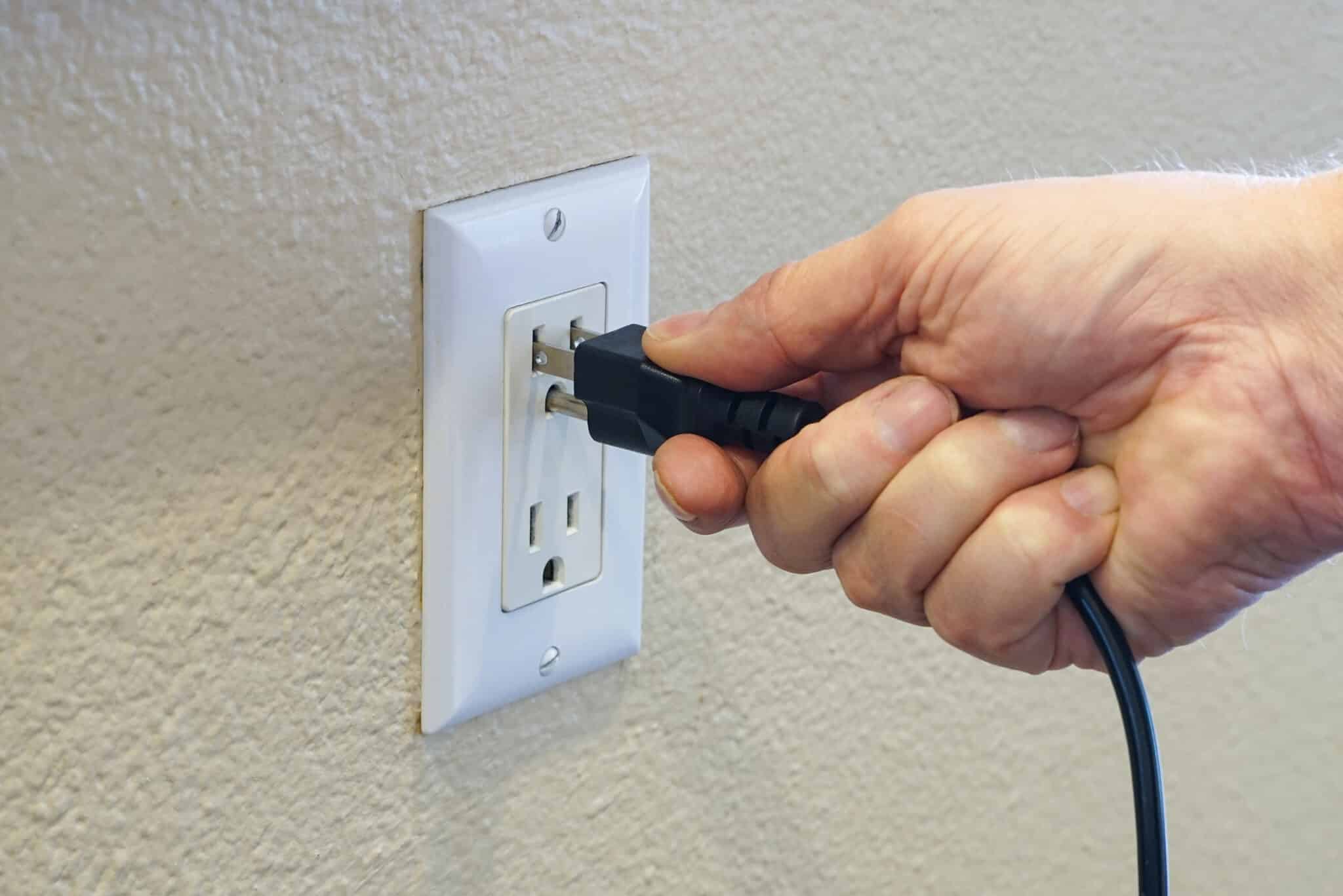Electrical issues like flickering lights or dead outlets can be more than just minor annoyances—they may signal serious problems. Here are five common electrical issues and how to address them:
- Flickering Lights: Often caused by loose bulbs or faulty fixtures. Tighten or replace the bulb and inspect the fixture.
- Tripping Circuit Breakers: Usually due to overloaded circuits, short circuits, or ground faults. Reduce electrical load or consult a professional.
- Dead Outlets: Check for tripped breakers, loose wiring, or faulty outlets. Reset breakers or replace outlets if needed.
- Frequent Light Bulb Burnouts: Caused by high voltage, poor socket connections, or overuse. Use correct wattage and consider switching to LED bulbs.
- Buzzing Sounds: Often due to loose wires or overloaded circuits. Tighten connections or call an electrician if arcing is suspected.
For persistent issues, always consult a professional to ensure your home’s safety.

Curious about why your lights flicker or why an outlet suddenly stops working? Electrical issues can sneak up on any homeowner, and while they might seem like minor annoyances, they can actually be signs of something more serious.
From tripping circuit breakers to buzzing sounds, understanding these common problems is essential for keeping your home safe. In this blog, we’ll walk through five electrical issues you might encounter and offer straightforward tips on how to fix them. Let’s get started!
Understanding the Importance of Electrical Safety
Before we dive into specific electrical issues, let’s take a moment to talk about the importance of electrical safety. Electricity is something we use every day, but it can be dangerous if not handled properly.
A small electrical issue like a flickering light might seem harmless, but it could indicate a bigger problem lurking behind the walls. Ignoring these signs can lead to more serious electrical issues, such as electrical fires or damage to your home’s wiring.
Keeping an eye on your electrical system is crucial, especially in older homes where wiring may be outdated. Regular checks and timely repairs of even minor electrical issues can prevent accidents and ensure your home remains a safe place for you and your family.
Plus, knowing when to call a professional can save you time, money, and potential headaches down the road by addressing electrical issues before they escalate.
Issue 1: Flickering Lights
Flickering lights can be more than just a small annoyance—they might be a sign of underlying electrical issues. Understanding why this happens is the first step to ensuring your home’s safety.
What Causes Flickering Lights?
There are a few reasons why your lights might be flickering:
- Loose Bulbs: Sometimes, the simplest explanation is the right one. A bulb that isn’t screwed in tightly can cause flickering. A quick check and twist might be all it takes to solve the problem.
- Faulty Light Fixtures: If tightening the bulb doesn’t help, the issue might be with the light fixture itself. Over time, fixtures can wear out or develop loose connections, leading to an inconsistent power supply to the bulb.
These causes might seem simple, but they’re important to address to keep your home’s electrical system running smoothly.
How to Fix Flickering Lights
If you’re dealing with flickering lights, here are some steps you can take to fix the problem:
- Tighten or Replace the Bulb: Start by ensuring the bulb is screwed in tightly. If it’s still flickering, try replacing it with a new one to rule out a defective bulb.
- Inspect and Replace Light Fixtures if Needed: If the bulb isn’t the issue, it’s time to check the light fixture. If you notice any loose wires or worn parts, replacing the fixture might be necessary. When in doubt, consult a professional to ensure the job is done safely.
By addressing flickering lights promptly, you can avoid more significant issues and keep your home safe and well-lit.
Issue 2: Tripping Circuit Breakers
A tripping circuit breaker is not just inconvenient—it’s a clear sign that something isn’t quite right with your electrical system. Understanding why this happens can help you prevent more serious problems in the future.
What Causes Circuit Breakers to Trip?
There are several common reasons why a circuit breaker might trip:
- Overloaded Circuits: One of the most common causes is simply too many devices plugged into a single circuit. When the demand for electricity exceeds what the circuit can handle, the breaker trips to prevent overheating and potential fires.
- Short Circuits: A short circuit occurs when a hot wire touches another hot or neutral wire. This can cause a large surge of electricity, which the breaker responds to by shutting off the circuit.
- Ground Faults: Similar to a short circuit, a ground fault happens when a hot wire touches a grounded part of the system, such as a metal wall box. This can be especially dangerous in areas with moisture, like bathrooms or kitchens.
These issues might seem technical, but they’re essential to understand to keep your home’s electrical system safe and functioning.
How to Fix Tripping Circuit Breakers
Here’s what you can do if your circuit breaker keeps tripping:
- Redistribute Electrical Load: Start by unplugging some devices or appliances and see if the breaker stops tripping. Spreading the electrical load across different circuits can often solve the problem.
- Identify and Repair Short Circuits: If redistributing the load doesn’t help, you might have a short circuit. This is more complicated to fix and usually requires the help of an electrician to locate and repair the issue safely.
- Install Ground Fault Circuit Interrupters (GFCIs): In areas prone to moisture, installing GFCIs can help prevent ground faults by cutting off power before it causes harm.
Taking these steps can help you manage and prevent tripping circuit breakers, ensuring a safer home environment.

Issue 3: Dead Outlets
A dead outlet can be a real inconvenience, especially when you rely on it for essential appliances or devices. But before you start worrying, there are some common causes and simple solutions to get it working again.
What Causes Dead Outlets?
There are a few typical reasons why an outlet might stop working:
- Tripped Circuit Breaker: Sometimes, a circuit breaker trips, cutting power to the outlet. This is a safety feature designed to prevent electrical overloads and potential hazards.
- Loose Wiring: Over time, the wires connected to your outlet can become loose, leading to a loss of power. This is especially common in older homes where the wiring might not be as secure as it once was.
- Faulty Outlet: Sometimes, the outlet itself is the problem. Wear and tear can cause outlets to malfunction, requiring a replacement to restore proper function.
Understanding these causes can help you quickly diagnose and address the issue, keeping your home’s electrical system in top shape.
How to Fix Dead Outlets
If you’re dealing with a dead outlet, here are a few steps you can take to fix it:
- Reset the Circuit Breaker: Start by checking your circuit breaker panel. If a breaker has tripped, resetting it could restore power to your outlet. This is often the quickest and simplest solution.
- Check and Tighten Outlet Wiring: If resetting the breaker doesn’t work, the next step is to check the wiring behind the outlet. Loose wires can be tightened, but if you’re unsure about handling electrical work, it’s best to call a professional.
- Replace the Faulty Outlet: If the outlet itself is damaged or worn out, replacing it might be necessary. This is a straightforward task, but again, if you’re not comfortable with electrical work, it’s safer to hire an electrician.
By following these steps, you can usually get your dead outlet working again, ensuring all your devices stay powered and ready to use.
Issue 4: Frequent Light Bulb Burnouts
If you find yourself constantly replacing light bulbs, it’s not just an annoyance—it could be a sign of a deeper electrical problem. Understanding why your bulbs are burning out so quickly can help you find a solution and save you money in the long run.
What Causes Frequent Light Bulb Burnouts?
There are a few common reasons why your light bulbs might not be lasting as long as they should:
- High Voltage: Sometimes, the electrical voltage in your home may be higher than it should be, causing bulbs to burn out faster than usual. This can also lead to other electrical issues if not addressed.
- Poor Connection in the Socket: If the bulb isn’t making a solid connection with the socket, it can flicker and eventually burn out. This is often due to a loose socket or a problem with the fixture.
- Overuse of Light Bulbs: Simply using your lights too often or leaving them on for long periods can cause bulbs to wear out more quickly. Certain types of bulbs, especially incandescent ones, are more prone to burning out with excessive use.
These causes might seem minor, but addressing them can improve the lifespan of your bulbs and ensure your home’s electrical system is functioning properly.
How to Fix Frequent Light Bulb Burnouts
If you’re tired of constantly replacing light bulbs, here’s what you can do:
- Use Bulbs with Correct Wattage: Make sure you’re using the correct wattage for your light fixtures. Using bulbs with a higher wattage than recommended can cause them to burn out faster.
- Check and Fix Socket Connection: Inspect the socket to ensure the bulb is fitting securely. If the socket is loose or damaged, it may need to be repaired or replaced to prevent further issues.
- Replace Old Light Bulbs with LED Bulbs: Consider switching to LED bulbs, which are more energy-efficient and last much longer than traditional incandescent bulbs. This simple change can reduce the frequency of bulb replacements.
By following these tips, you can extend the life of your light bulbs and maintain a well-lit, efficient home.
Issue 5: Buzzing or Humming Sounds from Electrical Devices
A buzzing or humming sound coming from your electrical devices can be unsettling. These noises are often a sign that something isn’t quite right with your home’s electrical system. Understanding what causes these sounds and how to fix them is crucial for maintaining a safe and quiet environment.
What Causes Buzzing or Humming Sounds?
Several factors can cause buzzing or humming sounds from your electrical devices:
- Loose Wires: One of the most common causes is loose wires. When wires are not securely connected, they can vibrate, leading to that buzzing or humming noise you hear.
- Overloaded Circuits: If you have too many devices plugged into a single circuit, it can cause the circuit to overload, resulting in a buzzing sound. This is often a sign that the circuit is under strain and needs to be balanced.
- Electrical Arcing: A more serious cause of buzzing or humming is electrical arcing, which occurs when electricity jumps between connections. This can be dangerous and is a sign that immediate attention is needed to prevent potential fires.
These causes can range from minor to serious, so it’s important to address them as soon as you notice the sounds.
How to Fix Buzzing or Humming Sounds
If you’re hearing buzzing or humming sounds, here’s what you can do:
- Secure Loose Wires: Start by checking for loose wires. If you’re comfortable doing so, you can tighten them yourself, but it’s often safer to have an electrician handle this to ensure all connections are secure.
- Reduce Electrical Load: Try unplugging some devices to reduce the load on the circuit. If the sound stops, you’ve likely identified an overloaded circuit as the cause. Redistribute your devices to prevent this issue from recurring.
- Call an Electrician for Arcing Issues: If you suspect electrical arcing, it’s crucial to call a professional immediately. This is not something to handle on your own, as it poses a serious risk of fire and requires expert intervention.
By addressing these buzzing or humming sounds promptly, you can ensure your home’s electrical system remains safe and efficient.

When to Call a Professional
While many electrical issues can be handled with a bit of DIY know-how, some situations require the expertise of a professional. Knowing when to call an electrician can save you from potential dangers and ensure that your home’s electrical system is in top shape.
Electrical issues that persist despite your efforts may indicate a more serious problem lurking beneath the surface. Don’t hesitate to seek professional help when the situation calls for it.
Identifying Issues That Require Professional Help
Certain signs clearly indicate that it’s time to bring in a professional. If your circuit breaker keeps tripping despite your best efforts, it could mean there’s a deeper electrical issue that needs expert attention.
Persistent flickering lights, even after you’ve tightened bulbs or replaced fixtures, might signal a wiring problem that only a professional can diagnose and repair.
Additionally, any burning smell or scorch marks around outlets, switches, or your breaker panel are serious red flags indicating a potentially dangerous electrical issue that requires immediate professional intervention.
Why DIY Electrical Repairs Can Be Risky
While it might be tempting to handle all electrical issues yourself, it’s important to understand the risks involved. Electrical work involves dealing with live wires and high voltages, which can be extremely dangerous if not done correctly.
A simple mistake can lead to severe injury or even worse consequences. Additionally, what might seem like a straightforward fix could be masking a more complicated electrical issue.
Without the proper tools and knowledge, you might not fully resolve the problem, leading to more significant electrical issues down the line.
Need Help with Electrical Issues? Call Mister Sparky of Lancaster!
Dealing with electrical issues in your home can be tricky and sometimes dangerous. Don’t leave it to chance! Whether you’re in Lancaster, York, or Harrisburg, PA, Mister Sparky of Lancaster is here to help.
Our professional electricians are ready to handle any electrical problem, big or small. Get peace of mind by calling us today!
FAQs About Electrical Issues
What Should I Do If My Circuit Breaker Keeps Tripping?
If your circuit breaker keeps tripping, it’s usually a sign that something isn’t right with your electrical system. Start by unplugging some devices to reduce the load on the circuit. If the problem persists, it might be due to an overloaded circuit, a short circuit, or a ground fault.
How Can I Prevent Electrical Issues in My Home?
Preventing electrical issues in your home involves regular maintenance and being mindful of your electrical usage. Make sure not to overload circuits, replace old or damaged wiring, and have your electrical system inspected by a professional every few years.
Is It Safe to Fix Electrical Issues Myself?
While some minor electrical issues, like changing a light bulb or resetting a tripped breaker, can be handled safely on your own, more complex electrical issues should be left to the professionals. DIY electrical repairs can be risky, especially if you’re dealing with live wires or high voltages.
How Often Should I Have My Home’s Electrical System Inspected?
It’s recommended to have your home’s electrical system inspected by a professional every 3 to 5 years, or more often if you live in an older home or notice frequent electrical issues. Regular inspections can help identify potential problems before they become serious, ensuring that your electrical system remains safe and efficient.
What Are the Warning Signs of Serious Electrical Issues?
Warning signs of serious electrical issues include frequent circuit breaker trips, flickering lights, burning smells, buzzing sounds from outlets or switches, and scorch marks around electrical fixtures. If you notice any of these signs, it’s important to contact a professional electrician immediately to prevent further damage or potential hazards.






